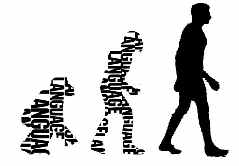Language evolution – it will never stop…so we need to find ways to keep pace with it.
Would you like to improve your conversational skills in business and social encounters and never struggle again for something to talk about?
Here’s my tip. Turn on your radio and listen to talkback. That will give you all the conversation topics you’ll ever need.
That includes a conversational gem that no ‘Top Conversation Starter Guides’ will ever suggest.
It’s language.
We love talking about language. Or rather, we love complaining about how everyone else misuses language and how language has degenerated, from ‘weasel words’ to texting slang.
For more evidence of just how much we care about our language, jump on the internet and type ‘improve your English’. You’ll find a bewildering and growing array of guides, blogs, tutorials, forums and articles about writing and speaking ‘properly’ at work and socially.
It suddenly all seems terribly obsessive. So why do we get so worked up about the way we use, misuse and rework language? And what’s the big deal about language changes?
Well, it’s a big deal and we get worked up about it because language is at the heart of who we are as individuals and community.
And because language change is disruptive. In business, that disruption brings a financial cost, as we keep up with ‘version change’, endlessly correct and micromanage ‘mistakes’, reassess the way we reinterpret things and implement that in our business activities.
Language is intensely personal…so we take it personally. Language is right at the core of every single human encounter. And we’re conditioned in the formative years of our lives about the ‘appropriate’ way we should use language in all situations.
And in today’s interconnected world with its powerful linguistic change agents at work, like our highly mobilised workforces, language is paradoxically buckled into codification and standards as never before. So we get very concerned about consistency and adherence to widely agreed protocols of language usage, as set out by dictionaries and generations of educators.
It’s just that ‒ strap it down as we would ‒ language keeps right on changing.
My take on it is: the more language is codified in the DNA of our business and social interactions, the more importance we place on using it consistently. And it’s a short step from there to judging each other’s language usage through a moral ‘right and wrong’ prism.
When this part of our core identity is challenged by inevitable change, or by the rise of other languages or language varieties, we feel personally affronted. And when our conditioning in ‘appropriate’ language usage is challenged when we move into different cultural work and social settings or by the rise of new language influences, that’s disruptive, too ‒ threatening, even. So out come the dictionaries and in come the language vigilantes.
It’s no wonder that complaints about language are one of talkback radio’s most enduringly consistent themes.
My beloved ‘Austrayan’ is a case in point. Not only is it still seen as a a sort of inferior colonial appendage to ‘proper’ British English, but Australian English’s natural evolution as a living language and its wonderful receptivity to change and enrichment ever since Europeans first settled in Terra Australis has been continually badged as being somehow wrong. Our degenerating grammar and punctuation. Our rising intonation? Our informal discourse and skewed semantics. Our shortened words. Our MareCanised lexicon. And our repulsive Strine accent.
In other words, our language has been evolving. That’s what language does, people!
But it hasn’t stopped us getting all antsy and ‘vunerable’ about it, frothing at our collective mouth that we’re succumbing to some kind of individual and communal moral failing.
I think this kind of breast beating completely misses the point about the very real challenges that language change presents in a fast-moving, highly connected, sophisticated and codified world. Language change brings both subtle and sharp changes in meaning. If you’re not alert and if the language codification process doesn’t keep up ‒ from compliance standards and instruction manuals through to group emails and voice-prompts ‒ there can be communication breakdowns, on a scale from amusing to fatal.
With massive and increasing global movement of people in business, let’s remember that you and I are born agents of language change and disruption. Our very participation in this global movement of people and business is fostering that change. You and I are the person with the amusing accent, the odd intonation, the differerent speller of the same word, the user of the same word for completely different meaning, the disrupter of hierarchy. Seeing it from this perspective, I think, is a disarming thought and a wakeup call to see this change – and to see difference – in a more measured light.
And let’s not forget the unalterable reality that language – for all that you can’t touch it, dig it up or label it ‘animal, vegetable or mineral’ – is a human, living, pulsating, constantly evolving thing. So even while I want to scream at individual’s who add possessive apostrophe’s at the end’s of their plural word’s, I know there’s no point getting worked up. It’s just an example of how punctuation is evolving. We’re not losing punctuation itself.
And there will always be what my linguistic lecturer referred to as the ‘principles of appropriateness’ to help guide us around the unspoken linguistic codes that go with any business or other socio-cultural situation.
It’s just that as language evolves, these codes and rules that support us to use language appropriately also need to adjust – and that’s a tough task with no end plan. How the rule books and our own social conditioning tell us we ‘should’ use language simply cannot keep pace with language’s relentless evolution.
I think that our anxieties about language also reflect our anxieties about ambiguity, our inherent need for certainty about our own identities and the shifting ways in which we manifest those anxieties.
Seeing your own language – the very core of your identity – shift under your feet in a world of constant change is confronting. And language change is all the more disturbing for being impossible to hold back.
So how to deal with language change in a practical way?
In my career, I’ve found it works for me to
- install and consistently use simple, practical version control systems that help me track and manage language change
- take a fundamentally traditionalist but not rigid approach to my own language usage
- apply a ‘get-real and get with it’ attitude about the reality of language change in my work
- adapt to the language variety of the market and organsiation I’m working with, and
- recheck, ask for advice and feedback, revise and revise again.
So, what’s your recipe for keeping up with language change, in both familiar and less predictable environments?



